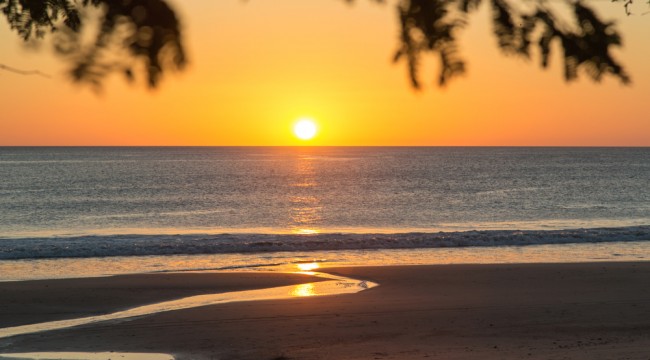The Closest Thing to Paradise This World Has to Offer
Some friends and co-workers spent their holidays at Rancho Santana in Nicaragua, where you can live like a king on a pauper’s salary. The beaches are among the best in the world, and the people are nuts for Americans. There is every amenity and consumer product, even better stuff than you can get at Wal-Mart. Local food is outrageously good. There are even local beers that best most on the market in the US. In general, it’s the real deal, the closet thing to a paradise this world has to offer.
…we had every expectation of finding a civil war… What we found was very different…
How do I know these things? Larry Reed, now president of the Foundation for Economic Education, and I visited this country for a full week during that volatile year of 1985. In those days, the superpowers had somehow decided to choose this little country as its theater for one of the last showdowns of the Cold War.
The US said that the communists had taken over at the behest of the Soviets and they were exporting their revolution around the region. The Soviets said that the US was trying to topple a democratically elected government by funding death squads. Remember Oliver North and all that? The drama was intense.
We went there to see what was going on. From the American press reports, we had every expectation of finding a civil war and communists battling it out with freedom-loving rebels. What we found was very different, indeed. We ended up meeting with leaders on both sides of the great issue of the day, but they weren’t dressed in battle gear. It was more like a political squabble of the kind that you find on Capitol Hill every day. We met with high-ranking officials in the current regime, as well as opposition leaders like Violeta Chamorro, who was later elected as president.
Before leaving on the trip, I had read a wonderful book by New York Times reporter Shirley Christian. It was called Nicaragua: Revolution in the Family. Her detailed report documented how what appears to be a revolutionary environment on the outside is actually a fairly normal tug-of-war between two ruling factions. Ideology plays very little role in reality beyond serving as a pretext of sorts. When one side gets control, it does things to hurt the other side, and so on. In other words, politics as usual.
I was amazed to hear this. This was a far cry from the language you were hearing from Washington at the time about how this was the battleground of the great Manichean struggle of our epoch. But it wasn’t just budding Cold Warriors like me who got taken in. There were first-world political pilgrims from the left who got sucked up into the theater and came to Nicaragua to experience the new egalitarian utopia as well. These people provided the main amusements for the week.
And so everywhere we went, we bumped into literature majors from the United States, seminarians from West Germany, women’s rights advocates from the UK and assorted Hollywood gadabouts who came to mix their labors with the liberators now in control. We all lived together in downtown Managua in a hotel that catered to our every need. So much for the workers and peasants. We truly lived like kings for a week.
Breakfast was amazing, with juices from all over the region. I’ve never seen anything like it since. The coffee was beyond-belief great, so strong that it had to be cut with hot fresh milk. You could eat a gigantic lunch and pay only a buck or two. Dinner always seemed to feature entertainment of some sort and the local liquor, which, I learned from experience, is rather dangerous for inexperienced drinkers.
My favorite bar was not far from the capitol building. I don’t recall the name, but at the time, I just called it the “communist bar.” That was because that’s where all the communists hung out to drink nearly every evening. Again, they were all from the United States and Western Europe, and they would sit around talking about the great utopia being built before their eyes. There were pictures of Che, Castro and Lenin on the walls. The reading material was Soviet Life magazine, and I would swear that some of the issues dated from the 1950s. Larry and I would flip through them and laugh uproariously at the pictures and propaganda. I don’t know whether this junk was brought in by the students or shipped directly by Moscow, but as I think about it, the former scenario is more likely.
One night we went to a movie. I was a smoker at the time, so I experienced that singular pleasure of blowing smoke up in the air during the movie and watching it mix with the light of the projector and create a beautiful film noir ambiance. I recall thinking that this was a pleasure that I could never experience in the United States. Maybe there is something to this communist idea after all! (Kidding.) I’ve since learned that smoking has been banned in theaters, and tragically so.
We hopped into a cab after the movie. Larry and I were in the back seat and two jaded-looking women were in the front seat. I tried to make small talk about how good the movie was. One of the women shot back at me: It was a terrible movie, but exactly what you would expect given how American imperialists send their cast-off flops down here to exploit the workers by extracting their money. Silence followed this stern lecture. I piped up again, innocently saying that, even so, I thought the movie was pretty good. She grunted extreme disapproval of my opinion, and we rode in silence until we got back to the hotel.
The next morning at breakfast, I met Gary Merrill, the former husband of Bette Davis who had starred in many films at his height, including Davis’ smash hit All About Eve. He was wearing a dress. I asked why. He said that he could do this in Nicaragua because it was a free country where the human spirit was liberated thanks to socialist control. I asked if he considered himself a communist. “All I know is that this works,” came the reply.
We had a charming meeting overall, but he said that he had to go because he was meeting with some government officials. That meant that he needed to change out of the dress and into a suit. I asked him why he must give up his freedom when meeting with government officials. He responded that it was just an intuition he had that he would make a better impression in a suit. Good intuition! We met with Gary several more times on that trip, and I can’t but have the fondest memories of his good cheer.
Later that day, we decided to do some sightseeing of government buildings. We were taking pictures like crazy at the ministry of defense building, asking all the soldiers and guards to pose. Some thug came up to us and told us to stop. We resisted a bit and suddenly found ourselves under arrest. They took Larry’s camera and planned to ruin all the pictures. But they never figured out how to open it. They gave us our equipment and let us go. The benefit from our point of view: We had a cool story to tell!
Looking back on the event, I’m realizing that the fastest way to get arrested in Washington, DC, would be to try to get as close as possible to the Pentagon with a camera and take pictures of all the guards. You would probably be held for slightly more than a few hours!
On this trip, I also learned something about currency exchange. The government in those days tried to keep tight control on the rates. There was a government rate that you got at the hotel and the airport. And then there was the market rate that you could get on the streets.
You didn’t have to look far to find a currency exchange dealer. There were kids that seemed as young as 7 and 8 years old, budding young entrepreneurs. They were everywhere outside the hotel, and no one bothered them. Their math skills were absolutely amazing. They could figure the exchange rates on any amount in a matter of seconds.
“A recent IMF report said that Nicaragua was the Central American country that best protected investors’ rights.”
How did they know the market rate? It is a bit mysterious to me, but they must have run back and forth to each other in some kind of cooperative/competitive arrangement, perhaps arbitraging with the dealers around the block or the other side of town. It was hard to say, but there was no question that they were the masters of the craft.
I think about this when I hear people object to the idea of competitive currencies in the United States. People say, oh, it would be so confusing and no one could figure it out! Perhaps there would be a learning curve, but surely over time, the math skills of the typical American could rise to the level of a peasant Nicaraguan child. It’s a tall order to be sure, but it is possible.
Much to my disappointment, we saw no bloodshed, death squads, gulags or secret missile stashes. All the communists I met I could have also met by visiting the local university. And the government officials were pretty much like those you would meet anywhere: greedy, lazy, puffed up and useless. Everyone knew this. I assume the same is true today.
A few years later, the “dictator” of Nicaragua submitted to a democratic election and was tossed out. Later on, long after the Cold War ended and everyone stopped caring about this country, he was re-elected. Nothing much changed either way.
“Most Americans,” writes investment guru Chris Mayer, “would be surprised to learn Nicaragua is the second-safest country in Central America, behind only Costa Rica. The World Bank ranks it as the easiest country in Central America, Panama excepted, in which to start a new business. Or that in ‘ease of doing business,’ Nicaragua ranks well ahead of such perennial darlings as Brazil or India — or even neighboring Costa Rica. A recent IMF report said that Nicaragua was the Central American country that best protected investors’ rights.”
I can believe that. It is certainly among the most beautiful places I’ve ever visited, and I would take a week here over any visit to the Old World on the Continent. The food is better and cheaper, and the people seem far more insistent on and appreciative of their core freedoms. People say that going there now reminds one of how few freedoms we have remaining in the US.
How history turned on a dime: Our country is looking more and more like the nightmare that the US said it was stopping from taking over Central America. Today, Central America is the beneficiary of a glorious benign neglect, whereas the “freedom fighters” finally got their way in the United States and brought us a tyranny that Daniel Ortega would never have dared impose even at the height of his power.
Regards,
Jeffrey Tucker,
for The Daily Reckoning
Ed. Note: For the past few days the Daily Reckoning email edition has been reaching readers by way of the Central American haven described above. The DR’s Managing Editor, Peter Coyne is down there right now exploring all that Rancho Santana has to offer… and scoping out a possible “chill weekend” retreat for a handful of lucky readers. For you chance to learn more about this incredible opportunity, sign up for The Daily Reckoning, for FREE, right here.



Comments: